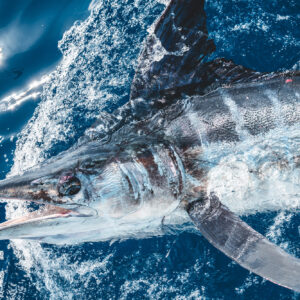More species of seabirds breed in New Zealand than anywhere else in the world. Seabirds are good indicators of what is below the water’s surface, this makes them an angler’s best friend. But when seabirds get close to the boat they can easily tangle in our fishing lines or get caught on baited hooks. This can be fatal for the bird and frustrating for the angler.
There are some simple steps we can take to avoid hooking or damaging seabirds. We need to learn these measures quickly as some of these seabirds are rarer than Kiwis and dying unnecessarily. Small changes in the way we fish can make a big difference to seabird survival. We might even catch more fish if we learn how to be smart around these natural fish finders.

Fish tidy
- Seabirds are hunting for food. Keep unused bait and scraps in covered bins until you have finished fishing.
- Gut and fillet your catch once your hooks are out of the water.
- Never feed seabirds while you are fishing. It only encourages them to hang about, get in your way when fishing and steal your baits.
Fish fast
- Sink your bait fast and well below the surface, particularly when there are lots of seabirds in the area.
- Take particular care around boil-ups or “meatballs”.
- Seabirds move fast – if birds are nearby keep a keen watch when setting and retrieving your fishing gear.
- A moving bait is very attractive to a hungry seabird. More time spent with a seabird means less fishing time.
Burley well below the birds
- Sink burley containers deep, further from the birds and closer to the fish.
Deter birds from your gear
- Create a ‘safe zone’ so you can get your gear up and down.
- Some fishers tie streamers to a spare rod or outrigger with a half-filled plastic milk bottle tied securely to the end. This bounces over the water and distracts the bird from your fishing gear.
- Others throw a bucket of water towards the birds to shoo them away from hooks and baits.
- A deck hose sprayed off the back of the transom is a good deterrent too.
Try these seabird smart guidelines
- Clean the decks and bin any scraps. Seabirds have an extraordinary sense of smell.
- Use a rig with heavy sinkers rather than casting light gear or surface fishing.
- Change the size or type of bait. Soft-baits are less attractive, although we are not sure about the very smelly varieties.
- Fish at night or early morning, when there are fewer birds around.
- Move further away from seabird colonies and feeding paths, particularly if you are set netting.
- Take a break or move to another spot.
Treat birds with care
If you do catch a seabird please treat it with care. Just like an undersized fish, the way you treat a hooked seabird can make all the difference to its chances of survival. The gear you use to release a seabird is very similar to the gear you would use to release a fish. It is useful to have this basic release kit organised, it includes items you would most likely have on board anyway:
- Line clippers or scissors
- Towel
- Pliers
- Landing net
How to de-hook a bird
- Wrap the bird in a towel and cover its eyes if possible.
- Hold feet firmly.
- Hold large bird’s beak shut, but don’t cover the nostrils or twist the beak.
- Cut the fishing line from the hook.
- Use pliers to flatten the barb or cut the hook with small bolt cutters.
- Pull the hook out.
What to do with a swallowed hook
- Wrap the bird in a towel and cover its eyes if possible.
- Hold feet firmly.
- Hold large bird’s beak shut, but don’t cover the nostrils or twist the beak.
- If the hook is swallowed, cut the line as close to the entry point as possible.
- Fishing line left dangling from the bird can tangle on plants, rocks or other birds.
The Hauraki Gulf has been described as the seabird capital of the world. If fishing in the Gulf or near seabirds this summer please take care to firstly avoid catching these rare birds, and if you do hook them, learn how to release them with as little damage as possible to you and the bird.
Seabirds and fishing go together – as Kiwi anglers we are the ones who can make a difference out on the water. Let’s fish seabird smart this summer.
LegaSea appreciates the support of the Southern Seabird Solutions Trust in providing this information.
See the latest tips and tricks at the FishCare website.





